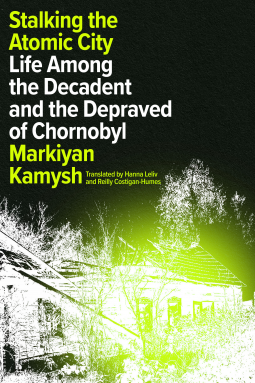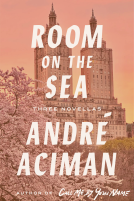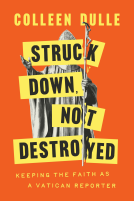
Stalking the Atomic City
Life Among the Decadent and the Depraved of Chornobyl
by Markiyan Kamysh
This title was previously available on NetGalley and is now archived.
Send NetGalley books directly to your Kindle or Kindle app
1
To read on a Kindle or Kindle app, please add kindle@netgalley.com as an approved email address to receive files in your Amazon account. Click here for step-by-step instructions.
2
Also find your Kindle email address within your Amazon account, and enter it here.
Pub Date Apr 05 2022 | Archive Date Mar 22 2022
Astra Publishing House | Astra House
Talking about this book? Use #StalkingtheAtomicCity #NetGalley. More hashtag tips!
Description
“A poetic rush to madness. . . a stunning, original voice as lyrical as it is unnerving."
—Alan Weisman, author of The World Without Us and Countdown
"In the shadow of catastrophe, Markiyan Kamysh writes with all of youth’s wayward lyricism, like a nuclear Kerouac." —Rob Doyle, author of Threshold
A rare portrait of the dystopian reality of Chornobyl, Ukraine, as it was before the Russian occupation of 2022.
Since the nuclear disaster in April 1986, Chornobyl remains a toxic, forbidden wasteland. As with all dangerous places, it attracts a wild assortment of adventurers who feel called to climb over the barbed wire illegally and witness the aftermath for themselves. Breaking the law here is a pilgrimage: a defiant, sacred experience.
In Stalking the Atomic City, Kamysh tells us about thieves who hide in the abandoned buildings, the policemen who chase them, and the romantic utopists who have built families here, even as deadly toxic waste lingers in the buildings, playgrounds, and streams. The book is complete with stunning photographs that may well be the last images to capture Chornobyl’s desolate beauty since occupying Russian forces started to loot and destroy the site in March 2022.
An extraordinary guide to this alien world many of us will never see, Kamysh’s singular prose that is both brash and bold, compared to Kerouac and gonzo journalists, captures the understated elegance and timeless significance of this dystopian reality.
Available Editions
| EDITION | Other Format |
| ISBN | 9781662601279 |
| PRICE | $22.00 (USD) |
| PAGES | 160 |
Featured Reviews
 Joseph C, Reviewer
Joseph C, Reviewer
Markiyan Kamysh, the author of this unusual book, is the son of a nuclear physicist and design engineer who worked as one of the “liquidators” after the 1986 nuclear disaster at Chernobyl – or, to use the alternative name favoured by Kamysh – “Chornobyl”. Perhaps because of this personal connection, Kamysh is obsessed with the Exclusion Zone that is still in place, spanning a radius of several kilometres around the remains of the Power Plant. Since 2010, he has ventured into this out-of-bounds area on numerous occasions, whether on his own, with friends, or with curious foreigners who appoint him as a “stalker” or guide to the Zone. Stalking the Atomic City is a curious blend of memoir and travelogue, peopled by dubious characters including reckless (and hapless) adventurers, looters, scrap-dealers, vandals, drug-addicts and alcoholics in search of a high. Throughout the book, there is a palpable sense of danger. The author’s own photographs highlight a desolate landscape, a toxic wasteland where wild animals (and police patrols) roam.
The text, rendered from the Ukrainian by Hanna Leliv and Reilly Costigan-Humes, has an idiosyncratic style which needs some getting used to. It veers from poetic (substance-induced?) ecstasy to expletive-strewn passages worthy of a hard-boiled thriller. The results are often original, but at other times maddeningly overwritten and overwrought, with hit-and-miss attempts at humour. Sometimes, awkward switches of tenses (past, present, future) and changes of POV create some confusion, although this strangely fits the discombobulating atmosphere of the Zone. Some examples will give a taste of what I mean:
""We threw our backpacks on the ground and started to climb in silence. At the height of a sixteen-story building, wind blew into our faces and our hands were frozen to the bone, as a frigid thaw stretched its wetness onto the antennas’ rusty skeletons, and my gloves got soaked through. My friend captured the panorama of the expanse of snow on his old phone. You can’t cram a hundred million impressions into two million pixels. Under the vault of those incredible constructions, myriads of drops crashed against the cold metal. Every moment brimmed with new sounds. You can’t stuff myriads of falling drops into millions of bytes of voice messages. Even if Erik Satie played on all the pianos in Prypyat at the same time, he wouldn’t have impressed me as much as those drops, wouldn’t have beaten my hungover memory as hard with a sledgehammer of bright impressions.
…
As a matter of fact, I don’t like taking new people along. Or some of the old ones, either. I have to take them where we agreed to go. To Prypyat, that is. But what if on the way to Prypyat, somewhere after Chornobyl-2, it occurs to me that I haven’t been to the Emerald summer camp for a hundred years and that its little cottages will soon crumble – what then? In short, when you bring someone along for a trip, it’s like you’ve thrown a manhole cover from the ninth floor onto your own head – a manhole cover of obligations and rules.
…
So, I return from the Zone and think to myself: “Here I am, back home, drinking my orange Hike, devouring brand-name chocolate bars, washing them down with Pepsi, and enjoying the spice of life. “ And then I realize that I have a few words to say to the folks criticizing consumer goods of modern civilization. To everyone who hates that you can buy ten kinds of frozen veggies and twenty kinds of cigarettes at the supermarket. You’re fuckers. Just taste a chocolate bar after a two-week trip to the Chornobyl dump; just feel the hazelnuts crunching on your long-unbrushed teeth; just take a swig of soda and only then can you curse having access to a large variety of foreign goods. Fuckers.""
Style apart, I guess that whether you love this book or not will depend on whether you’ll fall for its atmosphere. In that regard, I must say that Stalking the Atomic City appealed to my neo-Gothic sensibilities, the huge antennas and moody ruins replacing the decrepit castles and abbeys of old, the swamps and beasts standing in for the awe-inspiring Romantic sublime, the frisson of danger adding a hint of horror. And although the book is not strictly speaking a work of psychogeography, there are echoes of the genre in its descriptions of abandoned urban spaces, as in Lubyanka, “the oasis of the old Zone” where:
"The ghosts of dead grandmas still floated around…; clocks were in the cupboards, no longer ticking; jugs stood intact; and boots were lined up in the hallways… It still looks like the Zone of the nineties, those turbulent times when you went inside a house and you knew – someone had been living there just yesterday."
Stalking the Atomic City is more than a book, it is an experience. Whether it is to your liking is another matter, but the only way to know is to try it.
https://endsoftheword.blogspot.com/2022/01/Stalking-the-Atomic-City-Markiyan-Kamysh.html
STALKING THE ATOMIC CITY-Markiyan Kamysh
I received this to my Kindle free for the purpose of review. Admittedly I struggled to read this book because it was painfully honest and frightening to me.
The idea that someone would consider the adventure of being in Chornobyl after it was destroyed in 1986 was just interesting. I understand the idea of people trying to make sense out of Chornobyl and try to get their emotions steady. I understand the adventure of climbing over the fence "just to see" but staying there secretly seems scary. However, I have four boys and given that piece of history would have no doubt been an exploration event for them.
Well written and with our current situation in USA it takes on a new meaning for me. The Ukrainian people people are hiding everywhere and need American help. I found myself down as I read how difficult life is in Ukraine was but now I am seriously saddened by their plight.
I honestly finished this text just after the invasion started up in Ukraine, I have been worried about this writer ever since....with that said, there is a beautiful poetic nature to Staking the Atomic City that made me want to be a part of his travels. The writing is quite stunning. There are moments in the text that get a little repetitive, but his love for the town and the plant is infectious. He calls it a place to relax...and he tells us of others that at one time were going there regularly to scavenge or to hang their hat. He also speaks about the tourists that go there, which was also a regular occurrence....and if I am not mistaken, there were rumors that a group was taken hostage when Russia took over the plant during the last couple of months...but I don't know that to be true. In a lot of ways, one of the reasons why I chose this text is because it is about dark tourism, which is something I am very much interested in; I read a lot of texts about death and dying.
I am sure now, however, that touring is not taking place very much in Chernobyl anymore...which, based on what I read, is terrible for those who called the ruins home or some form of it.
We are all praying and/or thinking about you, Markiyan...and every one else that has been affected by Russia's genocide.
4.5 stars







